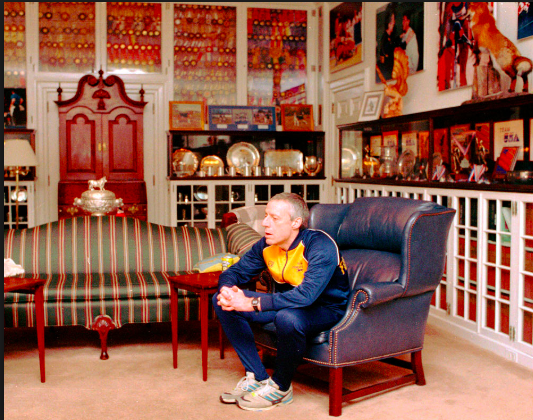Noble Brigham ‘20

Olympic Wrestler Dave Schultz was found dead on the land of eccentric millionaire John du Pont in January 1996. As reporters, curious onlookers, and police officer Tim Welch flooded the scene, Du Pont barricaded himself in a safe-room tucked away in his mansion. He negotiated with law enforcement over the phone, “referring to himself as the Dalai Lama,” according to Welch. For over two days, John du Pont remained inside his Newtown Square estate—the estate which would one day become the Episcopal Academy’s new campus.
John Eleuthere du Pont was a zoologist, stamp collector, and pentathlon athlete. Prior to the killing, Welch had known du Pont for decades. He lived on du Pont’s estate for many years. He recalls a period when the buildings on the EA campus served various purposes on the du Pont estate. Director of Operations Mark Notaro’s house, at the intersection of the Lower school parking lot and Bishop White Drive, belonged to the groundskeeper. The Alumni House was where du Pont’s farm workers lived. The Newtown Post, by the Lower School playground, was where local residents could buy the estate’s dairy products.
The upper class Main Liner was known to the community as a bizarre loner who had the money and influence to pull off strange acts. Welch remembers du Pont as being very quick to draw his gun, which he carried at all times. On one instance, Welch and his young son were fishing on the estate when du Pont jokingly fired a gun into their pond. Du Pont had a very close relationship with the local police department and took the badge he was given by them very seriously. He went so far as to impersonate a policeman, pulling over people who got too close to his estate for traffic violations they did not commit. In addition, he constructed a large shooting range, modelled after the FBI’s, and invited the police officers to practice their shooting, buying them, and himself, bullet-proof vests and portable radios. Welch says, “He would occasionally ride along with patrol officers and, later, patrol the area of his estate in his silver Cadillac Coup de Ville equipped with a police radio, red light and a siren. That practice stopped after the chief received several complaints from neighbors who were pulled over for speeding on roads adjacent to his property.”
Perhaps the quintessential symbol of du Pont’s extravagance was his Army surplus tank, which he drove both on and off his property. Welch recalls an eventful Christmas Eve when du Pont drove up to his house in the tank, his head bloodied from knocking over trees, and asked for Welch to “come out and play” with him. Everyone who knew du Pont, Welch included, dismissed such behavior as “eccentric.”
Du Pont was Head Coach of Wrestling at Villanova University, which, like many of his other titles, was given because of his buying power. Mark Schultz, brother of du Pont’s murder victim, writes in his book Foxcatcher that du Pont had donated so much that he had little accountability and got away with allegedly molesting athletes and violating wrestling regulations, such as providing all expenses paid trips to high school recruits and falsely promising them admission. Du Pont is arguably most famous for Foxcatcher, the wrestling team he established and dreamed of sending to the Olympics. It was ultimately David Schultz, Olympic wrestler and head of Team Foxcatcher, whom he shot and killed after learning about Schultz’s plan to take up an offer to coach wrestling at Stanford.
After the murder, du Pont was in prison until his death in 2010. He ordered his estate’s outer buildings to be dramatically painted black and erected a sign labelled “Foxcatcher Prison Farm,” believing that he would frighten his neighbors into begging for his release. William Sargent ‘22 says, “My dad told me about [the incident] because I was always fascinated by what happened there. When Dupont went to jail, his least favorite color was black, so he had all the buildings spray-painted black on the property…I’d always notice them on my way home from school. I asked my dad and he knew all about it because he used to live in Unionville.”
Today, another part of his estate has become the Toll Brothers Liseter development. Kevin Sporici ‘20, a student who lives there, says “I’m not very superstitious, so I’m not particularly creeped out by the history of this former estate. That said, John du Pont was a very eccentric man and while I am aware of some of the crazy things that happened here, I can’t help but wonder if some of the mysteries of the estate have yet to be uncovered.”
Many members of the Episcopal community do not know much about du Pont. Emma Humann ‘19 says, “People don’t talk about it. It’s very interesting, but people don’t really delve into the history of the campus because they don’t think about it that much.” Upper School Librarian Andrea Yu says “I remember they mentioned it during a walking tour for new teacher information…Although it was not ideal, we can create something beautiful out of something that was a dirty mark.”